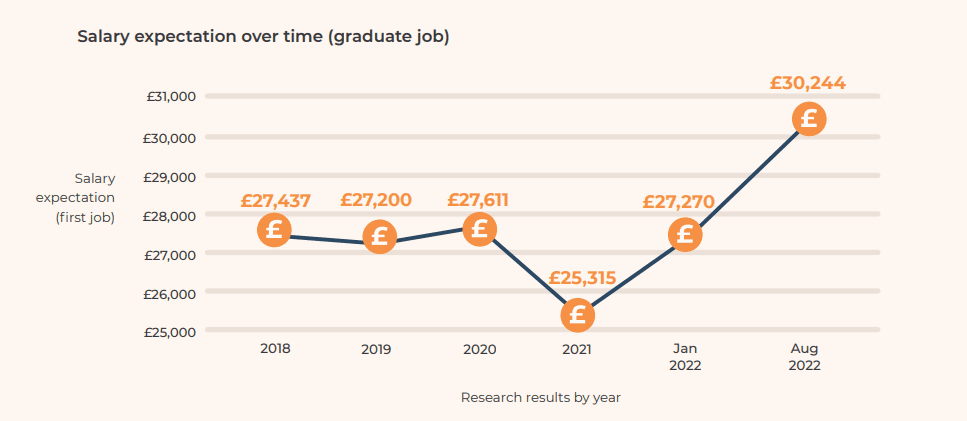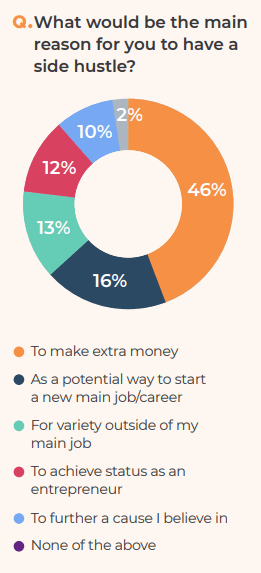Gen Z is worried about the looming recession
This is impacting their attitudes towards their salaries.
Why You Should Care
The cost of living crisis is real.
It has pushed Gen Z to become more concerned about their pay when job hunting.
Find out why Gen Z also don't want to work remotely full time.
A recession is looming across the world. Inflation is sky-high, and a cost of living crisis is underway.
While the US dollar is performing relatively well, the British pound, euro and renminbi are struggling. Inflation in the UK has reached a 40-year high of 10.1% in July, and now the pound has reached a record low against the US dollar.
In these challenging economic circumstances, new graduates are worried about their job prospects. 64% of 4,000 British students surveyed by Bright Network said that the financial situation will make it harder to find jobs.
While 71% are still confident they will secure a job, Gen Z graduates are concerned about their starting salaries. 83% said the cost of living crisis was impacting how they thought about their starting salaries – in fact, the pay they expect in their first job has increased 9% in six months from £27,000 to £30,000.

Credit: Bright Network’s Principled Pragmatists: the truth about Gen Z in the workplace.
The financial strain Gen Z is facing explains why 79% are keen to have a side hustle – 46% said this was because they wanted extra money, while just 16% said side hustles would help them learn new skills that might open the door to new and different career opportunities.

Credit: Bright Network’s Principled Pragmatists: the truth about Gen Z in the workplace.
Ultimately, as a result of the cost of living crisis, when it comes to their job hunt, the number one concern for Gen Z job seekers is salary and remuneration.
This is followed by employer’s commitment to wellbeing, diversity, equity and inclusive and flexible working (both around when and where they work).
Working at a purpose-driven company was the sixth most important factor for Gen Z, following the four-day week. Just 48% think a four-day week will become commonplace, although 74% are in favor as it would give them time to focus on their side hustles.
Bright Network CEO and founder James Uffindell commented that it is surprisingly that Gen Z are no longer prioritizing purpose in their job search. This is a major shift from previous data from the likes of Visier and LEWIS.
Uffindell added: “But it’s also impossible to isolate this finding from the concerns…about the current and near future economic climate, which is influencing Gen Z thinking on jobs and salaries. As such this response should be viewed in that context.
“Gen Z are purpose-driven up to a certain point, but they are also realistic and pragmatic about career opportunities and the need to make a living.”
Gen Z want to return to the office
While flexible working hours was the third most important factor in choosing an employer for Gen Z (and flexible location was fourth), Bright Network’s research found that 72% of Gen Z workers want to be in the office a minimum of three days a week.
They are very interested in the social aspects of work, with 89% thinking it is valuable to have friends at work.
This aligns with other research into Gen Z preferences globally. For instance, a study by the US National Society of High School Scholars (NSHSS) found that remote work is not a priority for Gen Z – this is linked to their view on learning and development.
63% of the 11,000 high school students surveyed by NSHSS said they wanted in-person training, and 26% wanted to learn from their boss directly; this is easier to do in-person.
This working location preference is positive for employers, many of whom are keen to get workers back into the office, at least part of the week.
But Bright Network’s talent acquisition partner Johnson Adeyanju warns: “This isn’t a ‘done deal’, though – and that view can change quickly if the experience is underwhelming, or if new graduates don’t see the value in coming into the office.
“For these reasons, it’s a good idea for employers to pay special attention to onboarding and how the office works for new graduate employees.
“Put structures in place to ensure new recruits are building professional networks with managers and peers, and social ties with peers in other teams which they may not work with directly.
“It may sound counterintuitive, but a really important element of this is more established, senior employees. If they are disengaged or unhappy, that permeates very quickly and can cause new Gen Z joiners to become disenfranchised and develop a negative view of that workplace.”
The world’s HR conference and expo is back! Don’t miss out on UNLEASH World in Paris this October.
Sign up to the UNLEASH Newsletter
Get the Editor’s picks of the week delivered straight to your inbox!

Chief Reporter
Allie is an experienced business journalist and can be reached at alexandra@unleash.ai.
Contact Us
"*" indicates required fields
Partner with UNLEASH
"*" indicates required fields